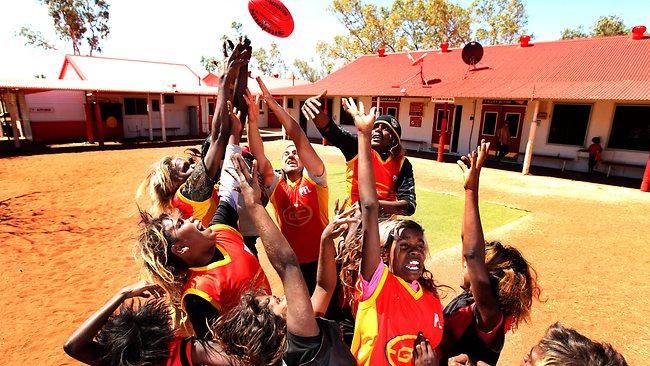Parent control gives kids the best marks
IN remote Parnngurr parents have taken charge of their children's learning and achieved stunning results.

IN Parnngurr on the edge of the Great Sandy Desert, parents have taken charge of their children's learning and have, with a bit of help from the mining industry, achieved stunning results.
The Parnngurr Community School has a unique partnership with the Martu people. The local adults decide which programs their children will take, and which ones do not suit. Literacy and numeracy lessons are written around topics that interest the children -- family, hunting and sport.
In the five years since the school began to go its own way, attendance has jumped from 50 per cent to 84 per cent.
Principal Dan Lynch says children at Parnngurr are still behind academically when they start Grade 1, but it now takes them two years instead of four to catch up.
"And once they catch up, they are advancing by a full academic year each year, they are keeping pace," Mr Lynch said.
Mr Lynch said Monday's announcement from Julia Gillard that an extra $6.5 billion would be pumped into education was fantastic, but he said his experience had taught him that a large portion of that money would fail to reach the students unless schools had the authority to make decisions about how it was spent.
"It can't just be that the money gets released into the 'one size fits all' programs," Mr Lynch said.
"We know that when that happens, the money gets spent on consultants from town and it doesn't hit the ground."
At Parnngurr, the school board decided two years ago to opt out of the National Accelerated Literacy Program. Mr Lynch said the decision technically locked the school out of a big source of funding, but the parents could not see where the benefits were. "This was supposed to be an amazing program and I am sure it does work in some settings but not here -- we had students who could not write their own name," he said.
The school opted for an interest-based literacy program, and with money from the charitable Martu Trust established from $60,000 a year in mining royalties, parents chose their own consultants.
Last year, the school of just 45 students won a coveted NAB Impact Award -- an acknowledgement of school-community partnerships that demonstrate improved student results.
The school day starts at 8am with breakfast and a quick game of Australian Rules football. By 8.30am, the students are in their classrooms -- each named after an AFL team -- where they do 90 minutes of literacy.
Mr Lynch said that, since the literacy program was tailored to the topics the children love, such as fishing or football, everyone has learned to write independently. At 10am, there is a 20-minute fruit break then the children work on their vegetable garden. They do maths and literacy before lunch then they study other subjects in a form called integrated learning.
The day always ends with some fun; art, music, football, bushwalk or a short hunting trip.



